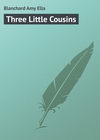Czytaj książkę: «The Four Corners Abroad»
CHAPTER I
THE FOURTH IN PARIS
It was at Passy that a little party of American girls were discussing the afternoon's plans one day in July. The three older girls were most interested; the two younger were too much engrossed in a game of Diabolo to notice very much what the others were talking about.
"You see it's raining," said Nan Corner, a tall girl with dark hair, "so we can't go in the Bois as we intended."
"Neither do we want to follow Aunt Helen's example and go hunting for antiques," put in Nan's sister, Mary Lee. "What do you say we do, Jo?"
Jo Keyes was drumming on the window-pane and looking out at the rather unpromising weather. "I see an American flag, girls," she said. "Hail to you, Old Glory! – Goodness me!" She turned around. "Do you all know what day it is? Of course we must do something patriotic."
"It's the Fourth of July!" exclaimed Nan, "and we never thought of it. For pity's sake! Isn't it ridiculous? We never made very much of it at home, but over here I feel so American when I remember Bunker Hill and Yorktown and our own Virginia Washington, that I could paint myself red, white and blue, and cry 'Give me liberty or give me death,' from out the front window."
"I beg you'll do no such thing," said Mary Lee, the literal.
Nan laughed. The twins stopped their play and began to take an interest in what was being said. "Do paint your face red, white and blue and lean out the front window, Nan," said Jack; "it would be so funny."
"Let Mary Lee do it," said Nan, putting her arm around her little sister; "she's already red, white and blue."
"Let me see, Mary Lee, let me see," said Jack, eagerly.
The others laughed. "Blue eyes, white nose, red lips," said Nan, touching with her finger these features of Mary Lee's.
"You fooled me," said Jack disgustedly. "I thought she might have lovely stripes or something on her face."
"Foolish child," returned Nan, giving her a squeeze. "We must do something, girls, and look 'how it do rain,' as Mitty would say."
"Can't we have torpedoes or firecrackers or some kind of fireworks?" asked Jean.
"The gendarmes might come and rush us all off to the police court if we did," Jo told her. "They're so terribly particular here in Paris, that if a cab or an auto runs over you, you have to pay damages for getting in the way."
"Thank heaven we're Americans," said Nan fervently. "I am more eager than ever to flaunt my colors. Of all unjust things I ever heard it is to run you down and make you pay for it. They needn't talk to me about their liberté, fraternité, and egalité. I'll give a centime to the first one who thinks a happy thought for celebrating, myself included."
Jo was the first with a suggestion. "Let's have a tea and invite the grown-ups, your mother and Miss Helen. We might ask that nice Miss Joyce, too. We can have red, white and blue decorations and dress ourselves in the national colors, and it will be fine."
"The centime is yours," cried Nan. "You always were a good fellow with ideas, Jo. Now let's set our wits to work. Who dares brave the elements with me? I shall have to go foraging in the neighborhood."
"I'll go," cried Jack.
"I'd love to go foraging," said Jean.
"If you want any assistance in carrying bundles, I'm your man," said Jo.
"Then you twinnies would better stay at home with Mary Lee," said Nan.
"But we do want to go, too," begged the two.
"I don't see why you want to get yourselves all drabbled, and very likely you'd take cold," remarked Mary Lee. "For my part I'd much rather stay in."
This quite satisfied Jean, but Jack still pouted until Nan suggested that she help Mary Lee arrange the room and think up their costumes; then the two oldest girls with umbrellas, rubbers and waterproofs set out. Mrs. Corner and Miss Helen had gone to the city to attend to some business at their banker's and would not return till later, therefore, the girls concluded, it would be an excellent time to try their ingenuity; they had been accustomed to do such things before now and their imaginations, never rusty at any time, were in good working order.
"I know what I shall do," said Mary Lee, as soon as the door closed after Nan and Jo. "I shall sew red stripes on one of my white frocks. I have some Turkey red I was going to make into a bag; I'll use that."
"What can we do?" queried Jean.
"We shall have to get the room ready first," Mary Lee told her, "and then we'll think of our dresses. Go into Aunt Helen's room, Jack, and get all the red Baedekers you can find, and if you see any blue books, bring them, too. Jean, go into all our rooms and bring any red-border towels you see."
"What are you going to do with them?" asked Jean, pausing at the door.
"You'll see. Trot along, for we haven't any too much time."
Jean ran off and presently came back with a lot of towels hanging over her arm. These Mary Lee disposed over the largest sofa pillow so as to give the effect of a series of red and white stripes, setting a blue covered cushion above the first. When Jack returned with the books, which she managed to drop at intervals between the door and the lounge, Mary Lee made neat piles on the table of the red and blue covered volumes, the white edges giving the required combination of color.
"There are a great many more red than blue ones," remarked Jack, watching the effect of Mary Lee's work. "I know what we can do, Mary Lee, we can cover some of the books. I saw some blue wrapping-paper in Aunt Helen's room."
"A good idea. Great head. Bring it along, Jack." And again Jack scampered off to return in a few minutes with the blue paper which Mary Lee used to cover the books needed.
"That does very well," she commented, surveying her work with pleased eyes. "Now we'll have to wait till Nan comes before we can finish up here. Fortunately Aunt Helen has blue and white tea things, and they will need only to be set on a red covered tray. I won't do that yet before I see what Nan and Jo bring back with them. Now, I'm going to sew the stripes on my skirt. We will see about you chicks when Nan comes."
She went off bent upon carrying out her design of wearing a red striped frock and blue tie. "I've a lovely idea," Jack whispered to her twin. "Let's go into mother's room and I'll show you." And the two disappeared closing the door behind them.
Half an hour later Nan and Jo returned. Mary Lee met them, red striped skirt in hand. "Well," she exclaimed eagerly, "did you manage to get anything?"
"Indeed we did," Jo replied. "Look at these flowers. Aren't they just the thing? We found an old woman around the corner with a cart full of flowers and we took our pick." She held up a bunch of red and white carnations with some blue corn-flowers.
"Perfect," agreed Mary Lee. "What else did you get?"
"Some red candies." Nan produced them. "We shall put them in that little blue and white Japanese dish of mother's. We have a beautiful sugary white cake, and I am going to make a little American flag to stand up in the middle of it. We have some lady-fingers which we shall tie up with red, white and blue ribbons, and with bread and butter I think that will do. My, Mary Lee! you've done beautifully. It looks fine. Who thought of the red Baedekers and the blue books?"
"I did, or at least Jack helped out the idea with the blue paper covers."
"Where are the kiddies?"
"In mother's room getting ready. I've been basting these red stripes on this skirt. I've the last one nearly finished. What are you going to wear, Nan?"
"I'd copy-cat your red stripes if I had time, but I can cut out some stars and paste them on a blue belt, maybe, and wear a white shirt-waist and a red skirt. Jo has a striped red and white waist she can wear with a blue tie. We must hurry up, for time is flying and I have still the flag to make."
They skurried around and soon had everything arranged to their taste. "Now I'll make the flag," said Nan, "though I'll never get as many stars as I need on such a tiny blue ground, for there are such a number of states. Perhaps I can find a scrap of that dark blue challis with the tiny white stars on it; that would do very well to paste in one corner."
Mary Lee and Jo followed her to the room which the three shared in common. The twins had a little room adjoining and from this issued a murmur of voices.
"Who has taken my paint box?" cried Nan diving down into her trunk. "I've looked everywhere for it. I was sure I left it on this table."
"I'll bet that scamp Jack has it," declared Mary Lee.
Nan opened the door leading to the next room and there beheld the two sitting on the floor, the color box between them. A mug of water stood near. Jack had just painted a series of ragged stripes across her white shoes and was regarding this decoration with much complacency. Jean was about to emulate her twin by similarly adorning the white stockings upon her slim little legs. She had carefully begun at the very top and had just made her first brush mark.
"Do you think there should be thirteen stripes?" she was asking Jack when Nan opened the door.
"You wretches!" cried the latter. "What are you doing with my paints?"
"We're just fixing up for Fourth of July," responded Jack thrusting out a brilliantly striped foot for Nan's inspection, and in consequence upsetting the mug of water over the color box.
"I should think you were just fixing up," returned Nan. "Just look at my color box. You've nearly used up a whole pan of vermilion, and now look what you have done. Get a towel, Jean, and sop it up. You've spoiled your shoes, Jack. They'll never be fit to wear again."
Jack looked ruefully at the feet in which she had taken such pride.
"Mayn't I stripe my stockings, Nan?" asked Jean looking up from her task of mopping up the water.
"No, chickie, I think you'd better not."
"But Jack has such beautiful stripes," said Jean regretfully.
"I'll tell you what you can have," said Nan. "I've a lot of red ribbons and I'll wind your sweet little pipe-stems with those."
Jean was so pleased with this idea that she did not mind the aspersions cast upon her slim legs. "That will be lovely," she agreed, "and it will save the trouble of painting. I saw it was going to be crite hard to have exactly thirteen stripes and all the same width."
Nan picked up the sloppy looking color box. "I've got to make a little flag," she said, "and as soon as that is done I'll get the ribbons for you." She bore off the colors into the next room and proceeded hastily to make her flag, sticking a bit of the starred challis in one corner for the field. When it was completed she looked around for a proper staff, and finally settled on one of her paint brushes whose pointed handle served excellently well to stick in the centre of the cake.
Having put it in place, Nan stood off to see the effect. "It doesn't look quite right," she observed. "What is the matter with it, girls?"
"You've made thirteen red stripes instead of having thirteen in all, red and white included," Mary Lee told her. She was always an exact person.
"Dear me, that's just the thing," said Nan. "Why didn't I know enough to do it right?"
"Never mind," said Jo. "Nobody will notice it, and I am sure it looks very well. Isn't the table lovely? I wish they would come."
"Oh, but I don't," returned Nan. "I've yet to dike, and I promised Jean to wind her legs for her. They will look like barbers' poles, but she'll never think of that, so please don't any one suggest it. It is so late I'll have to fling on any red, white and blue doings I can find."
"I'll wind the legs," volunteered Jo. "I'm all ready as you see, and you've had the most to do."
"Good for you," responded Nan. "I'll get the ribbons."
"Don't you think," said Jo, "that we ought to have speeches or something?" Jo was always great at that sort of thing.
"It wouldn't be bad." Nan was quick to accept the suggestion. "You get up a speech, Jo. We'll sing Yankee Doodle and Dixie to comb accompaniments, and I'll recite that poem of Emerson's about the firing of the shot heard round the world. What will you do, Mary Lee?"
"I might give a cake-walk," she replied; "that would be truly American."
"Let's all do a cake-walk," Nan suggested. "We have the cake, you see, and you can dance a breakdown, Mary Lee, and sing a plantation song."
"The programme is rolling up splendidly," said Jo. "Go along, Nan, and get dressed. If you stand here talking the guests will be here before you are ready."
Nan rushed off and, in her usual direct and expeditious manner, soon had herself arrayed. Her blue skirt, white shirt-waist and red sash gave the foundation of her costume which was further enlivened by a red, white and blue cockade, made hastily of tissue-paper snatched out of various places. This she wore in her dark hair while she had put on a pair of red stockings with white shoes, the latter made resplendent by huge blue bows.
"Your get-up is fine," cried Jo, regarding her admiringly. "You always outdo every one else, Nan, and with the least fussing and the slightest amount of material. Here I've taken the trouble to put these white stars on a blue belt, and Mary Lee has basted all those stripes around her skirt, yet look at you with that dandy little cockade and those fetching blue bows which didn't take you five minutes to make."
"There they come," cried Mary Lee.
"Start the teakettle, somebody, while I go tell Miss Joyce. I hope she has not gone out." She rushed off leaving the others to begin the tea-making. On the way from Miss Joyce's room, where she fortunately found the young lady, Nan encountered Mrs. Corner and Miss Helen. "Happy Fourth of July," cried the girl. "Get your things off, please, and come right in to tea; it's all ready."
"Good child," answered Miss Helen. "We are ready for tea, for we are both tired out. There was so much red tape connected with this morning's business. We'll be right in, Nan."
"You didn't get wet?"
"Fortunately we didn't, for we had a cab."
"Good! then you won't have to change your gowns. Don't stop to prink, mother dear, and come as soon as you can." She stopped to snatch a kiss from her mother and hurried back. Her costume had indicated that something out of the ordinary was going on, but the grown-ups were not prepared for what met their eyes when they entered the little sitting-room.
"Well, if this isn't just like you children," exclaimed Mrs. Corner when she saw the array.
"Is it just like them?" Miss Joyce turned with an appreciative smile. "Then all I have to say is that you have the dearest children in the world."
The entertainment began with Jo's patriotic speech which was given while the ladies drank their tea. There were sly hits at the rights and wrongs of foot passengers in Paris, references to the difficulties of the French language, to the law forbidding anything to be placed on the window-sills, to the lack of sweet potatoes and green corn, to the small portions of ice-cream served, and the whole oration was full of such humor as brought much laughter and applause. Jo was always happiest in such impromptu speeches. Next each girl provided with a comb covered with tissue-paper gave a shrill rendering of Yankee Doodle and Dixie, then followed Mary Lee's breakdown, and next Nan's recitation. After this the twins, not to be outdone, sang a ridiculous negro song, patting juba as they did it. The whole performance ended with a cake-walk in which Nan and Jack surpassed themselves, taking the cake amid much laughter and applause.
"I haven't laughed so much for a year," said Miss Joyce, wiping her eyes. "I must confess to having felt rather blue this gloomy day, but you dear things have driven my homesickness so far away that I don't believe there is any danger of its coming back for a long time, certainly not while you are in the house. How did you think of all this?"
"Oh, we often do such things on the spur of the moment," Nan told her. "It's much more fun than to plan a long time ahead. We never realized what day it was till Jo chanced to see an American flag hanging from a window near by. You know down in Virginia we don't make much ado over the Fourth, but here in Paris somehow it seemed quite different, and we suddenly felt wildly patriotic, so we had to let off the steam in some way, and this idea of Jo's was very easy to carry out."
"It's been an immense success," Miss Joyce assured her. "The decorations are so original, and such costumes, I don't see how you managed to get them up in such a short time."
Nan looked down at her flaunting blue bows. "It's nothing when you're used to depending upon whatever comes handy. This blue paper happened to came around a package, and one can pinch up a couple of bows in no time; as for the other things, it just means a little ingenuity. When we were out in California we used to have a different kind of tea every week, and it was lots of fun to think up something new."
"We like to encourage our girls to exercise imagination and invention," Miss Helen remarked. "Nowadays when children are not encouraged to read the old-fashioned fairy tales, and have so many toys that they never have a chance to invent any plays for themselves, there is danger of certain fine qualities of mind being left out of the composition of the coming generation."
"I quite agree with you," said Miss Joyce. "Creatures of 'fire and dew and spirit' must feed on different mental food from the ordinary, and I'm sure your girls will always possess individuality."
"That is what we are aiming for," returned Miss Helen.
Jack's intention was so good, that she was spared a scolding on account of the shoes, and the afternoon ended happily though it continued to rain dismally. Jack, it may be said in passing, seldom allowed an occasion to go by without getting into some sort of scrape, and that she had done nothing worse than spoil a pair of inexpensive white shoes was really to her credit. Jean admired her own red strappings so unreservedly that she continued to wear the decorations till bedtime, while Nan's cockade still adorned her head at the dinner table.
"We shall pass but one more national holiday over here," she remarked, "and what's the sense of being in a foreign country if you can't remember your own sometimes! To be sure the tri-color is French, too, but it means the United States to us." So ended this Fourth of July which was a day long remembered.
CHAPTER II
THE DAY OF BASTILLE
Madame Lemercier smiled indulgently when the afternoon's celebration was described to her. "Ah, but you will be here on our great day," she said. "And then, my friends, you will see. Paris is gay like that upon our holiday. If you have your Forrs July, and your great Vashington, we have our Fourteen July, our day of Bastille. We must zen see ze city, ze illumination, ze dance, ze pyrotechnic at night. You will allow, madame," she turned to Mrs. Corner, "that your demoiselles have ze freedom not encouraged at ozzer time. Ve are a free peoples more as before, upon zat day. Each does as he will, but we do not abuse, no, we do not take advantage of ze liberte, for zough we rejoice we do not forget our native politeness. It will be perfectly safe, zough a gentleman escort or two will not be of objection."
"What does Bastille mean, anyway?" whispered Jack to Jean as they left the dining-room together. "Is it anything like pastilles, those funny sweet-smelling things we had in California? Maybe she said Pastille, though it sounded more like Bas than Pas."
"I don't know which it was," confessed Jean. "I wasn't thinking much about anything she was saying. You'd better ask Nan; she'll know."
"Did Madame say Bas or Pas?" Jack put her question.
"She said Bastille," Nan told her, "and it isn't a bit like the pastilles you have in mind. In fact there isn't any more Bastille at all. Do you remember when we went to Mt. Vernon that we saw the big key there?"
"I believe I do remember something like a big key. What was it the key of? I forget."
"The Bastille was a great big fortress or castle, and was where they used to imprison nobles and other people who had offended the government or whom the kings wanted to get rid of. It was a very massive and strong place. Its walls were ten feet thick, and it had eight great towers. It was a terrible place, and when the Revolution began one of the first things the Revolutionists wanted to destroy was the great fortress, so they cried, 'Down with the Bastille!' Then they had a tremendous fight over it, for to the mass of people it represented the power of the monarchy, and to the monarchy and the nobles it meant their greatest stronghold. At last the Revolutionists got in, and it was destroyed, blown to pieces. The fight took place on the fourteenth of July and that is why they celebrate the day as we do our Fourth. It will be good fun to see what they do, I think."
"But it is ten days off. What are we going to do till then?"
"Lawsee, you silly child, there will be plenty to do. We're going to Versailles and to St. Cloud, to the Museé de Cluny, to Père le Chaise, to the Louvre, and dozens of other places."
"I want to go up the tour Eiffel," said Jack, who delighted in such performances, the higher up the better.
"I suppose you'll not rest till you get there," returned Nan laughing.
Indeed, there was enough to do in the next ten days to keep every one busy, for each had some special wish to be fulfilled and where there were five youngsters to satisfy, there was little danger of time hanging heavily on their hands. Mary Lee loved the Jardin des Plantes, Jo never tired of the boulevards, and delighted in riding on the tops of the omnibuses. Nan reveled in the Louvre and the Museé de Cluny, Jean liked the Luxembourg gardens, the Tuilleries and the river, Jack wanted to climb to the top of every accessible steeple and tower in the city. Whenever a church was being discussed her first inquiry was always, "Has it a tower?"
Paris was too full of opportunities for Jack to miss anything that was in the least feasible, and she was always so innocently unconscious of doing anything out of the way that it was hard to make her realize that she must be censured. As Miss Helen said, it was all the point of view, and from Jack's standpoint, if you did but tell the truth, did no one harm, and pursued what seemed a rational and agreeable course, why stand on the manner of doing it? She and Jean were allowed to play in the Bois within certain limits, for it was very near to their pension, and they could be found readily by one of their elders if they were wanted.
"But," said Mrs. Corner, "you must not go further without some older person with you." This order the children always fulfilled to the letter and Mrs. Corner felt perfectly safe about them.
But one morning, Jean chose to go back to the house for something she wanted, and on her return Jack was nowhere in sight. Jean waited patiently for a while, and then not daring to go beyond bounds, she returned to the house to report. Nan immediately left her practicing to go in search of her little sister. She ventured, herself, further than ever before, but after a long and fruitless hunt came back to where Jean had been left as sentry, this being the spot where she had parted from her twin.
Nan was not easily scared about Jack, but this time she felt there was cause for anxiety. Suppose she had fallen into the lake; suppose she had been beguiled away by some beggar who would strip her of her clothes and hold her for a ransom. Nan had heard of such things. "I hate to go back and tell mother," she murmured.
Jean began to cry. "Oh, Nan, do you think she could have been run over by an automobile?" she asked.
Nan shook her head gravely. "I'm sure I don't know, Jean. She always manages to turn up all right, and has the most plausible reasons for doing as she does, but this time I cannot imagine where she could have gone. Mother and Aunt Helen are both at home and so are Jo and Mary Lee, so she could not have gone anywhere with one of them." She again looked anxiously up the road.
"Oh, there she is," suddenly cried Jean in joyful tones.
"Where? Where?" cried Nan grasping Jean's shoulder.
"In that cab coming this way. Don't you see her?"
Nan waited till the cab stopped, then she rushed forward to see Jack clamber down from the side of the red-faced cocher, shake hands with two gaudily dressed women of the bourgeois class, and walk calmly off while the cab drove on.
"Jack Corner!" cried Nan, not refraining from giving the child a little shake, "where have you been? Do you know you have scared Jean and me nearly to death? Poor little Jean has been crying her eyes out about you."
"What for?" asked Jack with a look of surprise.
"Because she was afraid you had been run over or had fallen in the lake. Where have you been?"
"Just taking a ride around," said Jack nonchalantly. "You might have known, Nan," she went on in a tone of injured innocence, "that I wouldn't go anywhere without an older person when mother said we were not to, and there were three older persons with me."
"But didn't you realize that Jean wouldn't know where you had gone, and that she would be frightened about you?"
"I didn't think we would be gone so long," returned Jack. "You see I know the cocher quite well. He has a dear little dog he lets me play with sometimes. Aunt Helen always tries to have this man when she can, so to-day when he asked me if I didn't want to ride back with him, he was going back to the stand, you see, I said, Oui, monsieur, de tout mon cœur, and so I got up. Then just as we were going to start those two ladies came along."
"Ladies!" exclaimed Nan contemptuously.
"One of them had beautiful feathers in her hat," returned Jack defiantly.
"Well, never mind. Go on."
"They wanted to take a drive, but they wanted to pay very little for it, and finally the cocher said if I could go, too, he would take them for a franc and a half. So they went and they stopped quite a time; we had to wait, the cocher and I."
"Where was the place?"
"I don't know. It was somewhere that you get things to eat and drink. They didn't ask me to take any of what they were having."
"I should hope not. So then you waited, and the cocher brought you back?"
Jack nodded. "Hm, hm. He was going to take the ladies further, so when I saw you and Jean I said I would get down, and here I am all safe and sound," she added cheerfully.
"You ought to be spanked and put to bed," said Nan severely.
Jack looked at her with wide-eyed reproach. "Why, Nan," she said, "I didn't do a thing to make you say that. He is a very nice cocher; his name is François, and I am sure I minded mother. It would have been quite different if I had gone off anywhere alone. Mother said an older person, and François is very old; he must be forty."
"Well," returned Nan, "mother will tell you that you are not to go anywhere with strange cochers, or strange any other persons, and that will be the last of that sort of performance."
Jack gave a deep sigh, as of one misunderstood. It was very hard to keep up with the exactions of her family who were continually hedging her about with some new condition.
After this the days passed quietly till the fourteenth came around. Madame Lemercier pronounced the city deserted, while Miss Joyce declared it might be by Parisians, but was taken possession of by American tourists. The Corners, however, wondered whether it could be possible that it ever held any more than those who crowded the streets that evening when they all set out to see the sights. Along the Seine they concluded they would be able to see more than elsewhere, so they made the Louvre and the Palais Royal their destination. The streets were full of a good-natured, jostling throng. Every now and then the party would come upon some dancers footing it gaily in some "place" or at some street corner. The cafés were thronged, and there were venders of all sorts driving a thriving trade. From the bridges ascended splendid fireworks which were continually cheered by the gaping spectators. Illuminations brightened the entire way. No one forbade joking, singing students to walk abreast so they would take up the entire sidewalk, for no one minded walking around them.
"One can scarcely imagine what it must have been during that dreadful Reign of Terror," said Nan to her aunt when they reached the "Place de la Concorde." "This jolly, contented crowd of people is very different from the bloodthirsty mob that gloried in the guillotine then. Just over there the guillotine was set up, wasn't it? And, somewhere near, those horrible fishwives sat knitting and telling of the number of the poor victims. I think this 'Place de la Concorde' is one of the most splendid spots in Paris, but I can never pass it without a shudder."
"Too much imagination on this occasion, Nan," said her aunt. "You must not let your mind dwell upon such things when you are trying to have a good time. One could be miserable anywhere, remembering past history. I am sure to-night doesn't suggest an angry mob. Don't let us lose our party. We must keep an eye on them. I thought I saw Jack wriggle ahead, through the crowd, by herself."
"I'll dash on and get her," said Nan, "and stand still till you all come up." She managed to get hold of Jack before the child was wholly swallowed up in the crowd, and cautioned her to keep close to the others if she would not lose them.
But Jack was always resourceful and independent. "It wouldn't make any difference if I did lose you all," she declared. "I could find my way back, and the concierge would let me in."
"That cross old creature? I shouldn't like to bother him," returned Nan. "He is an old beast."
"Oh, no, he isn't always. If you call him monsieur often enough he gets quite pleasant," Jack assured her.
"I'll be bound for you," Nan answered. "We must stand here, Jack, till the others come up. Don't you think it is fun? I can't imagine where so many people came from, all sorts and conditions."
"I think it is very nice," returned Jack, "but I wish Carter were here with his automobile, and I wish he were here anyhow, so he could dance with me. I'd love to go dance out in the street with the rest of the people. Won't you come dance with me, Nan?"

















